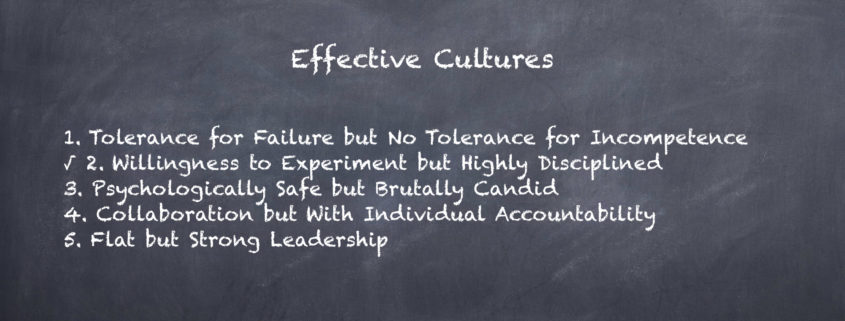A Word About Culture: Part Two
This is the second post in a series inspired by a Harvard Business Review article, “The Hard Truth About Innovative Cultures”, that posited these five characteristics of effective corporate cultures:
- Tolerance for Failure but No Tolerance for Incompetence
- Willingness to Experiment but Highly Disciplined
- Psychologically Safe but Brutally Candid
- Collaboration but with Individual Accountability
- Flat but Strong Leadership.
After distinguishing between mistakes and failures in the first post, we continue the series with an examination of experimentation and discipline from the perspective of our own organization.
First Things First
The premise of the article’s point #2 is summarized here:
Organizations that embrace experimentation are comfortable with uncertainty and ambiguity … They experiment to learn rather than to produce an immediately marketable product or service … [but they] select experiments carefully on the basis of their potential learning value, and they design them rigorously to yield as much information as possible relative to the costs. They establish clear criteria at the outset for deciding whether to move forward with, modify, or kill an idea. And they face the facts generated by experiments.
It’s fair to suggest we face facts first: We don’t know everything. We can’t predict everything. We can’t control (the outcomes) of everything. So, we approach every act of experimentation with discipline, informed by the years we spent as developers before founding Finys. Those facts — and the fact that our customers rely on us to make their businesses run better — compel us to approach new features or capabilities not as experiments but as trials based on previous empirical experiences: If this did that, we expect a particular variant of this to yield something new that’s a correspondingly particular variant of that.
Faith In, Faith Out
We choose to reward the faith our customers place in us by approaching every act of experimentation with all the discipline and all the knowledge we’ve acquired to date. We begin with clearly articulated and unanimously shared objectives. We celebrate the experiments that accomplish what we thought they would. And we nuke the ones that don’t. We won’t reward the faith of our customers by playing fast and loose with their businesses or their futures.
Uncertainty and ambiguity are parts of life and living. But facing facts with discipline is an effective way to foil failure.





Leave a Reply
Want to join the discussion?Feel free to contribute!